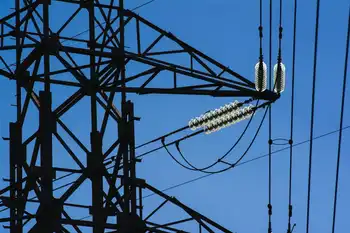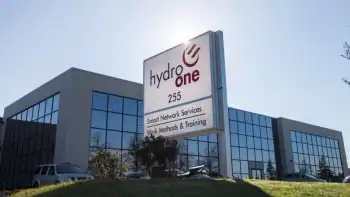FirstEnergy buying power rival Allegheny Energy
By Associated Press
Substation Relay Protection Training
Our customized live online or in‑person group training can be delivered to your staff at your location.

- Live Online
- 12 hours Instructor-led
- Group Training Available
The new company will be made up of 10 utilities serving 6.1 million customers from Ohio to New Jersey, with $16 billion in annual revenue and $1.4 billion in profit. The deal is expected to close within 14 months.
"It's a natural fit that has the potential to produce lower risk, higher growth, a cleaner generation fleet, a stronger balance sheet, and increased earnings," Anthony Alexander, FirstEnergy's president and CEO, told analysts on a conference call.
There haven't been many big deals in the power sector recently. The recession has made financing difficult to get and electricity demand has slumped — especially among industrial customers. That has forced utilities to slash costs and cut projects.
Gaining approvals for mergers from state regulators has been difficult as well. The First Energy-Allegheny deal must be approved by regulators in Maryland, Pennsylvania, Virginia and West Virginia as well as the Federal Energy Regulatory Commission.
Shareholders of Allegheny, based in Greensburg, Pa., will receive 0.667 shares of FirstEnergy common stock in exchange for each share they own. That equals $27.65 based on the February 10 closing price, and represents a 32 percent premium over Allegheny's closing price of $21.02 on the same day.
FirstEnergy also will assume $3.8 billion in debt.
Analysts say the combination of First Energy and Allegheny will cut costs and the combined company should benefit from a recovering economy. Deutsche Bank's Jonathan Arnold cautioned investors that it has been tough to close utility deals. He said the companies may be a good fit, but there has been no discussion about concessions for utility customers, a critical factor in getting state regulatory approvals.
The deal comes as Congress and federal regulators consider caps on emissions of carbon dioxide from power plants, along with tighter regulations on other sources of pollution.
The companies said 80 percent of their combined generation will come from highly efficient coal plants and nuclear power. Arnold noted that Allegheny has improved its coal-fired plants, mitigating the environmental risk they pose.
"Whatever we face down the road from a carbon standpoint we will be better positioned given the size and character of the combined fleet than we would have been, than either one of us would have been stand-alone," First Energy's Alexander said.
The combination brings together FirstEnergy's 4.5 million customers operating under such names as Ohio Edison, Cleveland Electric Illuminating and Jersey Central Power and Light with Allegheny's 1.6 million customers that receive electricity from such utilities as Allegheny Power and Potomac Edison. The company will become the largest utility in Pennsylvania with 2 million customers.
Alexander will remain the top executive of the combined company, which will be based at FirstEnergy's headquarters in Akron, Ohio. Allegheny's top executive, Paul Evanson, will become executive vice chairman and report to Alexander.
FirstEnergy also reported profit of $238 million, or 78 cents per share, for the quarter ended December 31 compared with profit of $332 million, or $1.09 per share, in the year-ago quarter.
Revenue fell to $3 billion for the quarter from $3.2 billion a year ago.
For the year, FirstEnergy reported profit of $1 billion, or $3.29 per share, compared with $1.3 billion, or $4.38 per share, in 2008. Revenue fell to $13 billion from $13.6 billion in 2008.











